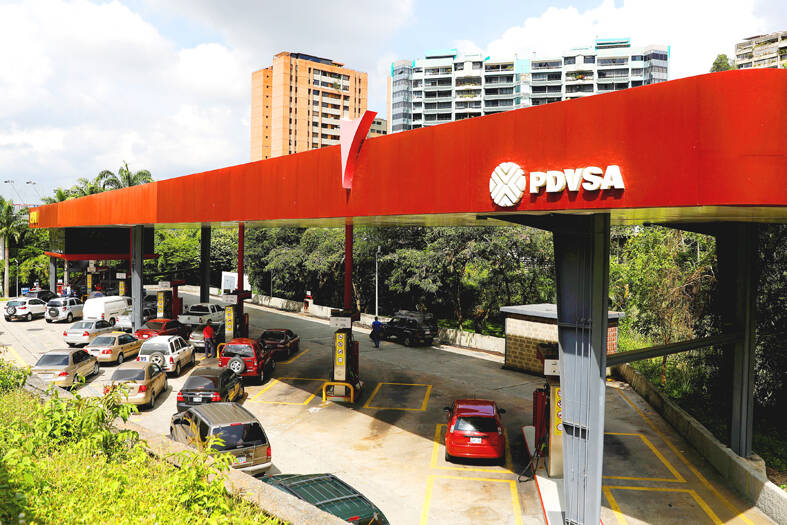The US government has notified foreign partners of Venezuela’s state oil company Petroleos de Venezuela SA (PDVSA) of the imminent cancelation of authorizations that allow them to export Venezuelan oil and byproducts, sources close to the decision by US President Donald Trump’s administration said on Saturday last week.
In recent years, former US president Joe Biden’s administration granted the authorizations to secure Venezuelan oil for refineries from Spain to India as exceptions to the US sanction regime on the South American country.
The companies that had received licenses and comfort letters from Washington include Spain’s Repsol SA, Italy’s Eni SpA, France’s Maurel & Prom Co, India’s Reliance Industries Ltd and US Global Oil Terminals LLC.

Photo: Reuters
Most companies had already suspended imports of Venezuelan oil following Trump’s imposition last week of secondary tariffs on buyers of Venezuelan oil and gas, according to sources and vessel tracking data.
The combination of tariffs and license cancelations to enforce sanctions is expected to squeeze Venezuela’s oil exports in the coming months, after they began to decline this month, data showed.
Last month, Venezuela exported 910,000 barrels per day of crude and fuel, more than January’s 867,000 barrels per day.
Similar measures by Trump’s first administration in 2020 knocked down Venezuela’s oil output and exports, creating the need for PDVSA to use intermediaries to allocate cargoes to China and leading to a pact with Iran. Those middlemen still do business with PDVSA.
Last month, Trump said a key license to US producer Chevron Corp to operate in Venezuela and export crude to the US would be canceled. Days later, the US Department of the Treasury ordered the company to wind down Venezuelan operations, and last week extended the deadline to May 27.
The withdrawal of the most important US license for Venezuela’s energy industry has sent a strong signal of Washington’s policy change toward Venezuela, as Trump’s administration also curbs migration, with a special focus on Venezuelans illegally in the US.
Following reports by international observers of irregularities in Venezuelan President Nicolas Maduro’s re-election last year, Trump has ramped up pressure on his government while accusing him of failing to make progress on electoral reforms and migrant returns.
It was not immediately clear if all PDVSA partners were given the same May 27 deadline to wind down operations. The terms of Chevron’s license termination also have not been completely clarified.
US Secretary of State Marco Rubio this month said that foreign oil companies in Venezuela would receive new guidance.
Maduro has criticized the sanctions, saying they amount to an “economic war.”

Real estate agent and property developer JSL Construction & Development Co (愛山林) led the average compensation rankings among companies listed on the Taiwan Stock Exchange (TWSE) last year, while contract chipmaker Taiwan Semiconductor Manufacturing Co (TSMC, 台積電) finished 14th. JSL Construction paid its employees total average compensation of NT$4.78 million (US$159,701), down 13.5 percent from a year earlier, but still ahead of the most profitable listed tech giants, including TSMC, TWSE data showed. Last year, the average compensation (which includes salary, overtime, bonuses and allowances) paid by TSMC rose 21.6 percent to reach about NT$3.33 million, lifting its ranking by 10 notches

Popular vape brands such as Geek Bar might get more expensive in the US — if you can find them at all. Shipments of vapes from China to the US ground to a near halt last month from a year ago, official data showed, hit by US President Donald Trump’s tariffs and a crackdown on unauthorized e-cigarettes in the world’s biggest market for smoking alternatives. That includes Geek Bar, a brand of flavored vapes that is not authorized to sell in the US, but which had been widely available due to porous import controls. One retailer, who asked not to be named, because

SEASONAL WEAKNESS: The combined revenue of the top 10 foundries fell 5.4%, but rush orders and China’s subsidies partially offset slowing demand Taiwan Semiconductor Manufacturing Co (TSMC, 台積電) further solidified its dominance in the global wafer foundry business in the first quarter of this year, remaining far ahead of its closest rival, Samsung Electronics Co, TrendForce Corp (集邦科技) said yesterday. TSMC posted US$25.52 billion in sales in the January-to-March period, down 5 percent from the previous quarter, but its market share rose from 67.1 percent the previous quarter to 67.6 percent, TrendForce said in a report. While smartphone-related wafer shipments declined in the first quarter due to seasonal factors, solid demand for artificial intelligence (AI) and high-performance computing (HPC) devices and urgent TV-related orders

MINERAL DIPLOMACY: The Chinese commerce ministry said it approved applications for the export of rare earths in a move that could help ease US-China trade tensions Chinese Vice Premier He Lifeng (何立峰) is today to meet a US delegation for talks in the UK, Beijing announced on Saturday amid a fragile truce in the trade dispute between the two powers. He is to visit the UK from yesterday to Friday at the invitation of the British government, the Chinese Ministry of Foreign Affairs said in a statement. He and US representatives are to cochair the first meeting of the US-China economic and trade consultation mechanism, it said. US President Donald Trump on Friday announced that a new round of trade talks with China would start in London beginning today,